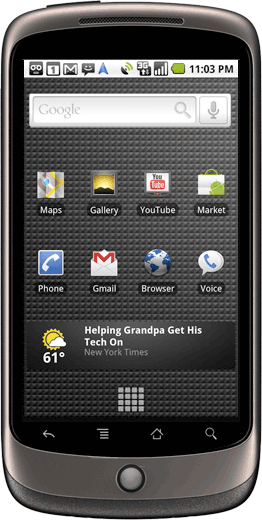Nexus One: Is Google pushing away from smartphone sales business?

Back in January, Google made a splash over the Nexus One smartphone - summoning the tech press out to the Googleplex for an introduction to not only the device itself, but also a new way of selling it.

It was a valiant effort but was flawed right out of the gate. First, there were questions galore on who would handle offline sales, support and service - Google certainly wasn't equipped to handle that. Then came the rumblings over what was perceived to be double "early termination fees" - those imposed by the carriers and a separate that would be charged by Google.
Google lowers Nexus One return fee - but is it enough?
Now, the company has quietly made one change to its Nexus One online store that suggests - for those of us trying to read deeper into it - that Google may be backing away from its push into the online smartphone sales business. (Techmeme) For months, its site has been pitching the Nexus One for Verizon as a "Coming in Spring 2010." This morning, the language was changed to read: For Verizon's network, you can buy the Droid Incredible by HTC, a powerful Android phone and similarly feature-packed cousin of the Nexus One.
Below that, there's a link that sends visitors to Verizon's website to place a pre-order.
Also see:
- Is Droid Incredible actually a Nexus One, but without the Google store experience?
- First look review: HTC DROID Incredible from Verizon Wireless
Here's hoping that Google finally saw the light and decided to rethink the strategy. One of its biggest flaws was that Google, as a retailer, was becoming a competitor to the carriers that it was also partnering with. The other big problem was that the unsubsidized device carried a price tag that clearly wasn't going to resonate well with consumers - $529.
None of this is to suggest that the current system of mobile phone sales, support and service is model is the perfect system that doesn't need changing. It's gotten better - but consumers do want more freedoms when it comes to buying mobile devices. If those sort of freedoms were in place, I would have bought an iPhone for my Verizon plan years ago.
Instead, I've completely lost interest in the iPhone and instead will likely walk into a Verizon store to pick up a Droid Incredible later this week. And I'll be relieved to actually buy it from a real person and walk out of store with one, instead of clicking on a "Buy Now" link and then waiting for a UPS driver to deliver it later.
There's no shame in trying to rock the boat a bit and Google gave it a good shot. There really wasn't much risk, given the overhead involved with the online store model, so Google didn't have much to lose. Pouring some cash into a marketing or advertising budget might have helped - after all, it helped the Droid gain some traction - but that alone wasn't going to make the online sales model work.
Google needs to stay focused on doing what it does best - enhancing a smartphone OS that will give the iPhone a run for its money, building that app developer community and cutting deals with a variety of device manufacturers and carriers.
That alone rocks the boat enough for me to want to jump on-board.